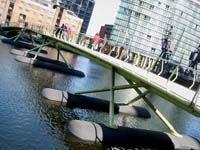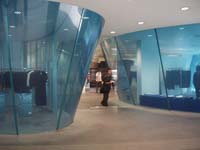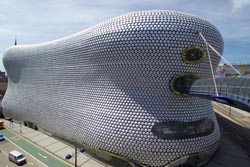FUTURE SYSTEMS
Topic: Architecture / Travel
 Last week featured TAKOTRON in London, where with my studio we toured fresh new urban landscapes. One highlight was a meeting with the London-based architecture firm, Future Systems. A couple of their completed projects can be found around town. In east London's Docklands is a pedestrian pontoon bridge--a floating lime-green slab that connects India Quay with Canary Wharf (completed in 1996). On the other side of the city they designed a new media center at Lord's Cricket Grounds. Inspired by the form of an SLR camera, the center is a semi-monocoque aluminum pod, offering a panoramic, unobstructed view of the field through it's glass facade (completed in 1999).
Last week featured TAKOTRON in London, where with my studio we toured fresh new urban landscapes. One highlight was a meeting with the London-based architecture firm, Future Systems. A couple of their completed projects can be found around town. In east London's Docklands is a pedestrian pontoon bridge--a floating lime-green slab that connects India Quay with Canary Wharf (completed in 1996). On the other side of the city they designed a new media center at Lord's Cricket Grounds. Inspired by the form of an SLR camera, the center is a semi-monocoque aluminum pod, offering a panoramic, unobstructed view of the field through it's glass facade (completed in 1999).  Future System's office is housed in a single-story brick building behind a parking lot, rather nondescript save for the neon-orange door. Once inside we found ourselves faced with a secretary who sat behind a gleaming white, curved, fiberglass desk. The huge open space around us was brightly lit, the busy staff shuffling around the fuchsia carpet in their socks.
Future System's office is housed in a single-story brick building behind a parking lot, rather nondescript save for the neon-orange door. Once inside we found ourselves faced with a secretary who sat behind a gleaming white, curved, fiberglass desk. The huge open space around us was brightly lit, the busy staff shuffling around the fuchsia carpet in their socks. 
We were given the huge honor of speaking with the firm's Czech-born ("millions of years ago in the middle of Europe") founder, Jan Kaplicky. He is a soft-spoken man, white-haired, thin, and extremely tall. For decades he has been designing curvy pod-like forms, and in the last several years has earned long-deserved recognition and some major commissions.

Many of these have been for high-design retail clients, such as Comme des Garçons, Maserati, and Selfridges. One question we had was how such innovative forms fit within their architectural context. Tokyo's Comme des Garçons (left) is on a street full of fancy designer's boutiques, but something like the Selfridges in Birmingham has much older, traditional surroundings. Mr. Kaplicky's answer was that the Birmingham store had nothing significant around it--"maybe an old church." Their goal was to create something bold and iconic that would revive a crusty old neighborhood, and from what I understand the new Selfridges, like a UFO plopped in the middle of town, has done exactly that.

Our studio was impressed with the amount of new, quality, exciting buildings that have been successfully developed in London. This is something largely missing in America, and we all want to know why. Mr. Kaplicky is outwardly dismayed that of the 20 or 30 magazine covers he has landed, only one has been in the States (New York Times Magazine), which he sees as a reflection of the US's architectural conservatism. He described being horrifed, riding to Manhattan and seeing the skyline (post 9-11) that "hasn't changed since the 30s," it's highlights still being the Empire State and Chrysler Buildings. To a degree this is true. Why does America have such trouble putting forth new, innovative buildings? We invented the elevator, skyscraper, microchip, and the blues, but are awestruck by the UK's computer-designed experimental structures and Rock in Roll. So what's our problem? Is it America's puritanical cultural conservatism holding us back? Is it economic? Political?
NYC's recent massive planning attempts have been utter failures, the Olympic bid imploding and the WTC project stagnating. Both have been plagued with bickering committees and private interest groups, with no one able to agree on anything. My theory is that one major ingredient in successful, innovative urban development is a powerful, progressive politician. Paris benefited hugely from President François Mitterand's grands projets, and London similarly under Mayor Ken Livingstone. Chicago has had more luck under Mayor Richard M. Daly's political machine than New York under its conservative counterparts Giuliani and Bloomberg.
Europe's grand cities are completely different animals from America's, and evidently their planning approaches as well. But whatever the reasons, America has got some issues and could benefit from looking to London's exciting urban environment (and Paris's, too, for that matter), before we're totally put to shame.
Future Systems: Official Site
Updated: Monday, 29 May 2006 11:57 PM CDT
Post Comment | View Comments (3) | Permalink | Share This Post